 |
|
Highlights from Tuesday, 27
February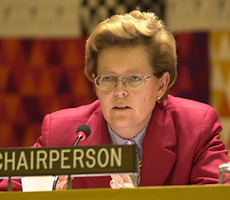
Delegates
made general comments on the draft negotiating text entitled: submitted
by the Co-Chairs of the Group of Experts (E/CN.17/ESD/2001/L.1).
The draft text outlines challenges and recommendations related to
seven key issues: accessibility of energy; energy efficiency; renewable
energy; advanced fossil fuel technologies; nuclear energy technologies;
rural energy; and energy and transportation. The draft text also
contains sections on: overarching issues (research and development,
information-sharing and dissemination, markets, technology transfer,
capacity-building, financial resource mobilization, and multi-stakeholder
approach and public participation); regional cooperation; and international
cooperation. Above
photo: Co-Chair Irene Freudenschuss Reichl (Austria)
Click
here for coverage on a briefing on the High Level Regional Meeting
on Energy for Sustainable Development for Asia and the Pacific held
in Indonesia, 23-24 November, 2000
|
|
JoAnne
DiSano, Director, Division for Sustainable Developement, made
the distinction between the InterAgency Task Force and the Energy
Expert Group and said they are not dependent on each other. She
said the Task Force's aim is to consolidate efforts and avoid duplication
on the issue of energy within the UN system. She invited delegates
to a attend a briefing on the Task ForceWednesday, 28 February.
|
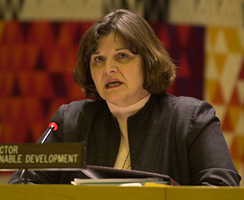
|
|
|
| |
|
Above,
JoAnne DiSano, Director, Division for Sustainable Development,
Co-Chair Irene Freudenschuss Reichl (Austria) and Co-Chair
Mohammad Reza Salamat (Iran)
|
|
|
Iran,
for the G-77/China, presented the positions of the group. The
Group proposed, inter alia deleting reference to carbon sequestration
and to "wide-scale" application of carbon capture and storage under
advanced fossil fuel technologies. On the overarching issue of public
participation, suggested strengthening the capacity of community-based
organizations and the role of women |
On nuclear
energy, Saudi Arabia suggested insertion of a new subparagraph
on the phase-out of nuclear energy. On the overarching issue of
making markets work better, Saudi Arabia, opposed the EU
and suggested including the re-adaptation of existing energy tax
structure in developed countries to reflect their environmental
pollution.
|
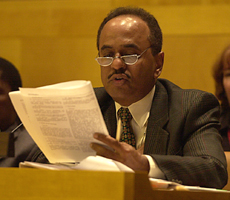 |
|
|
On enhancing
energy efficiency, China enhancing technology transfer and
increasing financial support was critical. Regarding rural energy,
China proposed adding text on sustainable forest management. China
also emphasized the right of all countries to develop nuclear energy. |
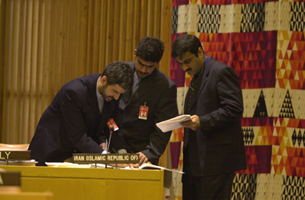 |
Members
of the Iranian delegation huddle before the morning session to go
over amendments they will present on behalf of the G-77/China. On
overarching issues, the G-77/China, with Colombia, the Russian
Federation and Saudi Arabia,proposed deleting a section regarding
a message to other intergovernmental bodies under international
cooperation.
|
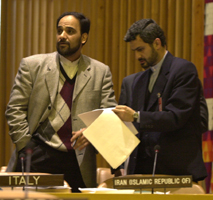 |
|
|
Colombia,
supported by Barbados and Guyana, suggested a new paragraph on phase-out
of transboundary movement of nuclear waste, especially through the
coasts of non-OECD countries. Barbados suggested language stating
that nuclear energy sources are neither appropriate nor acceptable
for use in Small Island Developing States, to which Saudi Arabia
added "all developing countries." On renewable energy, Colombia,
supported by Cuba, Algeria, Guyana, proposed including reference
to the World Solar Program.
|
|
On
rural energy, Sweden, for the EU, said stressed the role
of biomass, and high investment costs and connection fees that hamper
production and use of renewables in rural energy supply. On the
overarching issue of making markets work better, the EU, supported
by Australia, suggested creating open and competitive energy markets
within a regulatory framework.
|
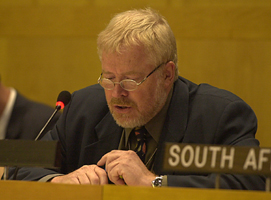 |
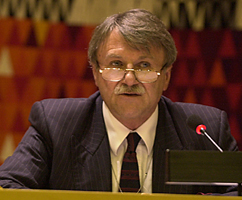 |
On
energy efficiency, Australia (left), with Canada, Norway, Japan,
and Turkey, opposed references to indicative goals for energy efficiency.
On rural energy, Australia said difficulties in energy provision
relate to the structure of energy markets in rural areas. On the overarching
issue of research and development, he suggested wording to reflect
further incentives for private sector investment within an enabling
environment with equitable sharing of risk in energy production and
distribution. |
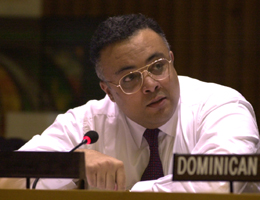 |
On
capacity building, Antigua and Barbuda,
supported
by Canada
(right), highlighted the role of GEF. On information sharing
and dissemination, the US, supported by Canada and Australia,
suggested including information on inter alia costs and ancillary
benefits associated with environmental technologies and suggested
internet-based clearing-house mechanisms. The Egyptian delegate
(left)
|
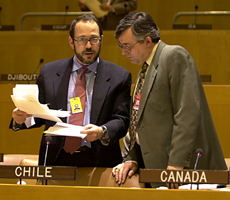 |
|
Briefing on the High Level Regional
Meeting on Energy for Sustainable Development
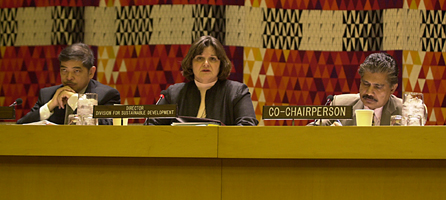 This
side event provided a briefing on the High Level Regional Meeting
on Energy for Sustainable Development held in Bali, Indonesia, 23-24
November, 2000, which was sponsored by the Indonesian delegation.
A summary of this event is contained in E/CN.17/2001/10. Panelists
included JoAnne
DiSano, Director, Division for Sustainable Development (photo: left
center) who said she
believed the outcome of the Bali meeting (the Bali Declaration and
the Programme of Action had contributed significantly to the future
of energy and to the energy issue. She said it provided an exemplary
illustration of what can be done at the regional level, in terms
of regional cooperation. Filino Harahap of the Indonesian delegation
(bottom right), said the conference addressed how to deliver
subsidies to targeted groups. He also highlighted difficulties in
combating smuggling of oil and other liquid fuels because of disparities
of prices with neighboring countries. Bob Alderson, Australia
(bottom left), provided a briefing on the results of a business
meeting held at the Bali conference. He said four working groups
dealt with: energy end use efficiency; access to energy services
in remote locations; energy infrastructure; and energy and environment.
He said business risks must be shared between governments and business,
and that the key ways to ensure balance include making sure that
the regulatory environment is transparent and predictable. He said
some subsidies will be necessary sometimes, but that they must be
well targeted and transparent, and should relate to infrastructure,
rather than prices. Pranesh Chandra Saha, Environment and Natural
Resources Development Division, ESCAP (bottom center), said
that through the Bali Declaration and a regional
action programme, the Asia and Pacific Region has developed a common
platform to develop issues in the region. He underscored the commitment
of governments in accelerating a shift toward sustainable energy
use, and highlighted priority areas, in particular accessibility
of energy. He said one of the action areas is devoted to meet the
needs and priorities of pacific island countries, and to create
renewable energy in developing island states. He highlighted results
of the NGO symposium organized in parallel to the conference. He
said that now the programme must be translated into concrete action. This
side event provided a briefing on the High Level Regional Meeting
on Energy for Sustainable Development held in Bali, Indonesia, 23-24
November, 2000, which was sponsored by the Indonesian delegation.
A summary of this event is contained in E/CN.17/2001/10. Panelists
included JoAnne
DiSano, Director, Division for Sustainable Development (photo: left
center) who said she
believed the outcome of the Bali meeting (the Bali Declaration and
the Programme of Action had contributed significantly to the future
of energy and to the energy issue. She said it provided an exemplary
illustration of what can be done at the regional level, in terms
of regional cooperation. Filino Harahap of the Indonesian delegation
(bottom right), said the conference addressed how to deliver
subsidies to targeted groups. He also highlighted difficulties in
combating smuggling of oil and other liquid fuels because of disparities
of prices with neighboring countries. Bob Alderson, Australia
(bottom left), provided a briefing on the results of a business
meeting held at the Bali conference. He said four working groups
dealt with: energy end use efficiency; access to energy services
in remote locations; energy infrastructure; and energy and environment.
He said business risks must be shared between governments and business,
and that the key ways to ensure balance include making sure that
the regulatory environment is transparent and predictable. He said
some subsidies will be necessary sometimes, but that they must be
well targeted and transparent, and should relate to infrastructure,
rather than prices. Pranesh Chandra Saha, Environment and Natural
Resources Development Division, ESCAP (bottom center), said
that through the Bali Declaration and a regional
action programme, the Asia and Pacific Region has developed a common
platform to develop issues in the region. He underscored the commitment
of governments in accelerating a shift toward sustainable energy
use, and highlighted priority areas, in particular accessibility
of energy. He said one of the action areas is devoted to meet the
needs and priorities of pacific island countries, and to create
renewable energy in developing island states. He highlighted results
of the NGO symposium organized in parallel to the conference. He
said that now the programme must be translated into concrete action.
|
|
RELATED
LINKS
Meeting
Documents:
Related
Links:
Past
IISD Coverage:
|
|



